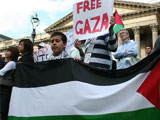Gaza devastation awaits legal action
28 Jan 2009
By Joharah Baker for ISN
Surveying the wreckage in Gaza following 22-days of heavy pounding by Israel, a visibly emotional UN Secretary General Ban Ki-Moon condemned the devastation as "outrageous, shocking and alarming."
The secretary general made his trip after the bombs had been halted and Israel's ground troops had mostly pulled back to Gaza's outskirts. In particular, Ban was focused on Israel's bombing of UN installations during its attack to allegedly halt Hamas' rockets from being fired into Israeli territory and arms being smuggled through the intricate underground tunnel system between Gaza and Egypt.
The United Nations Relief and Works Agency (UNRWA) was one of the hardest hit targets. On 6 January a UNRWA-run school in the Jabaliya Refugee Camp took a direct hit from an Israeli missile. According to Palestinian and UN statistics, over 40 civilians were killed and hundreds of others injured in the strike. Two other schools were also struck, along with UNRWA's main warehouse, which was hit by three Israeli shells - one which struck the agency's fuel supply. Three people were injured and millions of dollars worth of badly needed food, supplies and medicine were destroyed.
Israel's onslaught into Gaza, which began on 27 December, claimed at least 1,300 lives. The majority were innocent Palestinian civilians, including approximately 400 children. In some attacks, families were almost completely annihilated, such as the Balousha family of Jabaliya. Five of the seven daughters were killed by an Israeli bomb that exploded over their home as they slept.
Stories of babies dying in their mothers' arms have been recounted, of adult corpses trapped in collapsed buildings for days, while their still living children lie next to them, waiting for rescue. These are stories of displaced Palestinians, many of whom lost their original homes in the war of 1948 and took refuge in the Gaza strip. According to Palestinian and UN estimates, approximately 200,000 Palestinians in Gaza have been internally displaced from the Israeli "Cast Lead" operation, 45,000 taking shelter in the strip's 49 UNRWA-run schools.
Israel maintains it does not target civilians and was only intent on stopping Hamas from firing rockets at Israel. However, the death of so many innocents has resulted in calls for investigations into potential Israeli violations of international humanitarian law (IHL).
Evidence of potential IHL violations is mounting. In one incident, the International Committee of the Red Cross (ICRC) accused Israel of delaying ambulances trying to reach an area shelled days earlier. Several corpses were found at the shelled house along with weak and traumatized children lying next to their dead mothers.
"This is a shocking incident," said Pierre Wettach, ICRC chief for Israel and the occupied Palestinian territories. "The Israeli military must have been aware of the situation but did not assist the wounded. Neither did they make it possible for us or the Palestinian Red Crescent to assist the wounded," he said. The ICRC later suggested that Israel had broken IHL by not assisting the wounded and deliberately barring others from reaching them.
In broader terms, the Fourth Geneva Conventions demand that an occupying power protect the occupied population, something which reputable human rights groups and lawyers have argued that Israel has systematically failed to do over the 42 years of its occupation of the West Bank, Gaza strip and East Jerusalem. In Gaza, Israel has also been accused of illegally applying collective punishment against the civilian population, when it imposed economic sanctions there following Hamas' takeover of the strip in 2007, effectively plunging the vast majority of its 1.5 million people deeper into poverty, unemployment and hunger.
Now that the ominous drone of Israel's F-16s, tanks and Apache helicopters has finally fallen silent, the question is whether the international community will fail the Palestinians yet again. Naturally, it is to the UN that the Palestinians turn most often. Unfortunately, however, Palestinians have felt the sting of unheeded resolutions concerning their cause spanning the past 40 years. UN Security Council Resolutions 242 and 338 calling for a withdrawal of Israeli troops from areas they occupied in the 1967 War have been largely ignored over the years. More recently, the 8 January Security Council resolution calling for a ceasefire in Gaza was shunned by the Israeli government, which claimed it "had not yet achieved its goals."
In 2004, the International Court of Justice's advisory opinion on Israel's separation wall in the West Bank deeming it illegal was also disregarded by Israel, which insisted the wall was primarily to keep Palestinian suicide bombers from reaching Israeli cities. It is of Palestinian, and many others', opinion that the wall is primarily Israel's de facto border between Israeli and Palestinian areas given its inclusion of large swaths of West Bank land on which major Israeli settlement blocs are built.
For the Palestinians, the failure of international law to deliver justice is partly due to the political protection provided to Israel by its powerful, steadfast ally, the US. Throughout the years, the US has systematically torpedoed any international attempt to hold Israel accountable for violations of international law in the Occupied Territories. From the massacres committed in Palestinian villages in 1948, through the1982 massacre of 2,000 Palestinians in the Sabra and Shatilla refugee camps of Lebanon up until this most recent aggression on Gaza, the US has continued to offer Israel the diplomatic cover it needs to sidestep international prosecution for its crimes.
With the recent inauguration of US President Obama, Palestinians are wary of expecting too much but still confident that the international climate will improve following the exit of George W Bush. Gaza's wounds are still painfully fresh and waiting for the world to take action. Only time will tell if President Obama is willing and able to shift the paradigm of US-Israeli relations and debunk Israel's conviction that it can repeatedly act above international law.

